Africa increasingly turns to its private sector to cover its capacity gaps in sanitation and waste management. Our propensity for convenience as a society, usually in the form of disposable products, comes at a hefty price. There is an emerging stream of MHM-related waste that is increasingly disposable and non-biodegradable, posing adverse consequences to the environment.
The Private Sector Association in Menstrual Hygiene (PSAHM), an MHM non-profit, noticed the changing face of the MHM sphere and the need for private sector-driven sustainable approaches in the sub-sector. On World Menstrual Day, 26th May 2023, PSAHM co-convened a workshop with National Environment Management Authority (NEMA) and the African Population and Health Research Centre (APHRC) to seek ways in which to incentivize the private sector on sustainable MHM waste disposal and management.
The Workshop brought together diverse stakeholders and experts from the public sector, private sector and civil society. The workshop’s objectives were to;
- provide a platform to share experiences and expertise
- raise awareness on the importance of sustainable MHM waste management
- foster collaboration and partnership between MHM sub-sector stakeholders; and
- explore ways to promote sustainability in MHM by incentivizing the private sector through appropriate adjustments in policy and regulatory environment.
The one-day event comprehensively defined the dysfunction in MHM and the inequality in distribution of products and services.
The Workshop ended on an energetic note with participants pledged partnerships for progress, innovation and regulatory/policy incentives for sustainability as the way forward.


